The Connecticut Coalition to End FGM/C Interview Series: Jo Keogh
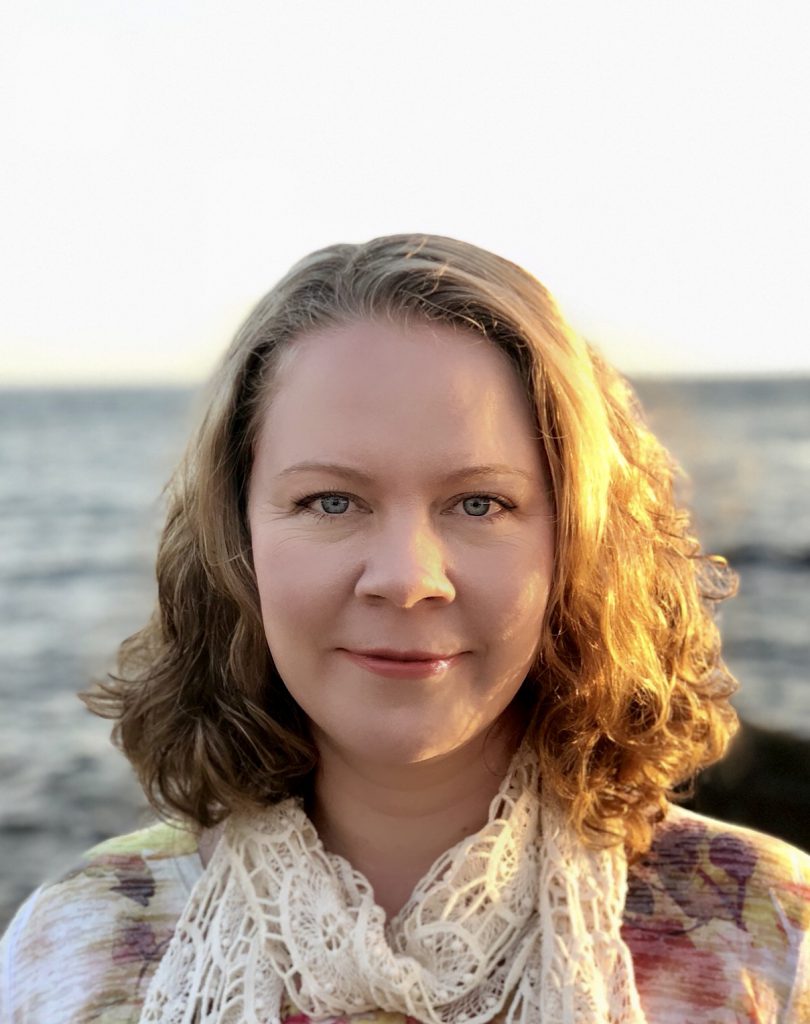
By Juliet Shires Recently, policy interns at Sahiyo have been interviewing members of the Connecticut (CT) Coalition to End FGM/C to learn more about each individual and to better understand all the important work they contribute towards ending FGM/C. The information below comes from an interview between Sahiyo’s former policy intern, Azalieh Erawoc, and CT Coalition member, Jo Keogh. Jo Keogh, a member of the Advisory Board at Sahiyo, is a founding member of the Connecticut Coalition to End FGM/C. She is passionate about issues surrounding the practice of FGM/C due to her background as a mental health counselor working with women with post-traumatic stress disorder resulting from gender-based violence. “Trauma is one of the biggest issues we have to deal with personally, societally, globally,” says Keogh, “I feel that it influences a lot of what is going on in the world today…without systemic change, healing on an individual level becomes impossible for a lot of populations.” Keogh got involved with FGM/C advocacy after reading about how a 2017 Michigan case overturned federal law, resulting in states being responsible for criminalizing FGC and conducting educational outreach. Keogh looked for a Connecticut law to protect those at risk of undergoing the procedure, but there were none. This inspired her to search for any bills about the issue in her state. Eventually, she reached out to Mariya Taher and Sahiyo after seeing their success in Massachusetts, and thus, the Connecticut Coalition to End FGM/C was born. Keogh emphasized the need for better education surrounding FGM/C for meaningful change. “Education is everything,” says Keogh.”In a perfect world, I wouldn’t have a job anymore…I wouldn’t be working with discrimination claims during the day and I wouldn’t be working with traumatized women at night. None of that would be necessary”. Keogh herself admits that at the beginning she didn’t know much about FGM/C, assuming it was a practice that didn’t occur in today’s world, let alone in the United States. “95% of what I know now about FGM/C, I didn’t know at the beginning. I just knew I didn’t want it to happen in my state…like me, the mass majority of people in this country have no idea what’s going on.” Keogh emphasizes the need for better education around FGM/C, explaining that many people ignore issues with an “it doesn’t affect me” attitude. The key is finding a way to educate people in a way that sticks and doesn’t just become a social “cause of the moment” to enact long-lasting change. Furthermore, Keogh recognizes how non-survivors of FGM/C should use their privilege to better educate themselves. She highlights her experiences of “shutting up and observing” when speaking with survivors in order to learn more about how FGM/C has affected others. Keogh has learned we shouldn’t make generalizations when speaking to survivors, and understands that not all women view their experiences as negative (for example, some women who have undergone FGM/C wear their experiences as a badge of honor). Not everyone will agree with the notions you may possess and it is important to remember that when doing this work, any advocacy “always, always, always must be survivor-centered.” Keogh also discussed the importance of mental health for advocates trying to improve laws around FGM/C. “I think sometimes with advocacy there’s this sense to be “on” all the time […] and to keep fighting until it’s done,” she says. “And I think it’s really important to give ourselves permission to tag out for periods of time without feeling guilt or that we’re “not doing enough.” “It’s important to figure out how much of yourself you can give at any point in time and to honor that,” she continues. “And not have guilt around that. If we come into the fight with a quarter of ourselves we’re just going to get knocked out. So, if we have to tag out, it’s ok. We can always come back in. It doesn’t mean we don’t care, it doesn’t mean we’re not passionate, it just means that we’re human”. Keogh encourages anyone who wants to be involved to participate knowing everyone has a unique set of skills to bring to the Coalition: “All of us have a particular constellation of knowledge that nobody else on the planet has. Advocating from that place is, I think, really powerful”. Looking forward, Keogh is optimistic about the future of legislation in Connecticut and the work ahead of the Connecticut Coalition. “What I’m seeing is women legislators, specifically, getting angry… Anger is one of my favorite emotions. I think anger is the emotion that is the closest to love, because we only get angry about what we value, [so if] they’re angry about it, it means they value the issue. They value the idea that women and girls should have protections against being cut in this state. Passivity is the death of an issue.” We would like to thank Jo Keogh for taking the time to sit down with our policy intern and for her continued work with the CT Coalition. To see the other interview spotlights we’ve conducted click here. Want to get involved? Visit https://endfgmcinct.com/ for more information or contact the CT Coalition Volunteer with Sahiyo Sign the petition to end FGM/C in CT
Navigating Complexity: Understanding and Addressing Challenges Faced by Kurdish Women with FGM/C

By Osman Mahmoudi UNICEF reports that FGM/C remains prevalent in Iraqi Kurdistan, affecting over half of women who live there. The profound impact of this practice requires urgent medical and psychological support for survivors. However, a lack of specialized professionals in the region, and limited awareness of treatment options and complications, pose challenges. Cultural taboos and social constraints further impede survivors from seeking help, leading to discrimination, stigma, and reluctance to access essential services. As a family counselor and psychotherapist specializing in FGM/C, I have conducted extensive research and provided psychological, sexual, and physical services to survivors and their partners. Between 2019 and 2023, I conducted numerous workshops for local teams in Iraqi Kurdistan, focusing on effective communication with survivors and providing comprehensive care. These sessions focused on understanding the complications of FGM/C and breaking the taboo’s surrounding the discussion of this practice. The workshops highlighted the lack of readily available psychological support for survivors, as well as cultural and social obstacles they face in opening up about their struggles. They also highlight how professionals – like doctors – lack awareness regarding proper treatment methods for FGM/C. However, participants’ eagerness to learn and enhance care emphasized the need for continuous education and training in this domain. These experiences underscore the potential for improving survivor care through ongoing learning and educational initiatives. In 2023, after concluding the training sessions, the educational materials used were compiled into a publication titled “Living with FGM in Kurdish Regions.” This book aims to fill a significant gap in existing literature, and serves as a guide to help survivors enhance their quality of life. The book comprises five chapters, each of which explores various aspects of FGM/C: The first chapter dives into the historical and cultural context of the practice in Iraqi Kurdistan Chapter two focuses on the challenges Kurdish women face in openly discussing their experiences Chapter three stresses the importance of addressing survivors’ physical health through comprehensive medical examinations and management strategies Chapters four and five explores the psychological and sexual impacts of FGM, offering insights into therapeutic interventions As a handbook, this publication also provides practical guidance on psychosexual therapy and social services. It marks a culture-oriented approach in the domain of “Life with female circumcision,” emphasizing the importance of respecting and empowering survivors while tailoring therapeutic approaches to their individual needs. Osman Mahmoudi is a family counseling doctor, researcher, and trainer specializing in FGM in Iran. His research aims to enhance the psychosexual well-being of FGM survivors by improving access to quality healthcare in the region. He earned his doctorate in family counseling from Shahid Chamran University of Ahvaz. Additionally, Osman Mahmoudi is dedicated to advancing sexual rehabilitation for FGM survivors in Kurdistan, Iran, through his ongoing study. Related links: This Father’s Day, join our campaign Survivor Support Resources
This Father’s Day, join our campaign

In honor of Father’s Day 2024, Sahiyo’s male engagement program, Bhaiyo is launching a public awareness campaign to uplift the importance of male voices and allies in ending female genital cutting or FGC. Recognizing that FGM/C is a community health issue – not just a woman’s issue – the movement to end FGC needs additional male voices and allies to bring this issue to the forefront. This June, we’ll be holding a month-long campaign asking community members to share how they have raised the topic of FGC in conversation with the men in their lives – their brothers, fathers, husbands, friends, and more. To participate in the campaign: Send us a video, quote, write-up, or photo about your experience engaging with men on the topic of FGC Alternatively, you can send us a video, quote, write-up, or photo that uplifts how men can engage, educate, and build awareness about ending FGC Submit your items to info@sahiyo.org by June 16th, 2024. The materials will be gathered together and shared on Sahiyo’s social media platforms throughout the month of June. Below are some questions you can consider asking someone in your life while trying to initiate a conversation about FGC: When did you first come to know about FGC? What is the role men can play in educating communities about FGC? How can brothers/fathers make an impact in these conversations about ending FGC? What message would you like to give to all the fathers and brothers out there about ending FGC? You can ask for your experience to be shared anonymously, if you prefer. For comments and inquiries about the campaign, please reach out to Samman Masud at samman@sahiyo.org. PS: Sahiyo will soon be launching a survey around male engagement on FGC during our June Father’s Day campaign. We’ll be sharing more information in the future about how to participate! Related links: How I took part in the Each One, Reach Bhaiyo Campaign: My experience with different Bhaiyos
Building Support for the Connecticut Coalition to End FGM/C After Failure in 2024 Legislative Session

By Juliet Shires In the 2024 legislative session, the Connecticut Judiciary Committee failed to raise a bill that would protect children from female genital mutilation/cutting (FGM/C). Rep. Jilian Gilchrest (D) would have sponsored the bill to create educational and outreach programs, issue civil remedies for survivors, and make FGM/C a clear criminal offense in the state. This marks the need for renewed efforts to build a stronger coalition to address this issue in legislation. Zehra Patwa, a survivor of FGM/C, U.S Advisory Board member for Sahiyo, and CT resident outlines the disappointment many feel at the negligence of not raising this bill despite widespread support: “I’m extremely disappointed that, despite strong support from both sides of the aisle, the bill to protect girls was not raised this session. Protecting the bodily integrity of girls could not be more important especially as we know, anecdotally, that the practice of FGM/C thrives in secret. This bill would have protected girls from the practice but also would have cared for those who have undergone this practice. Not having this bill pushed through puts girls and women in danger and tells them “You are not important”. That is unacceptable in my opinion.” The Connecticut Coalition to End FGM/C was formed in 2020 by individuals who were concerned about Connecticut being only one of nine states without legislation banning the practice of FGM/C. One such Connecticut resident included Jo Keogh, a psychotherapist who worked with organizations such as Sahiyo and the U.S. End FGM/C Network to form the original Coalition: “About 95% of what I know now about FGM/C, I didn’t know at the beginning [of the coalition]. I just knew I didn’t want it to happen in my state,” says Keogh. Furthermore, there was fear that Connecticut could become a “safe haven” for people seeking to perform FGM/C from neighboring states in which FGM/C is illegal. The CT Coalition aims to bring an end to the practice of FGM/C in the state by advocating for a holistic bill that includes educational outreach and input from the community, including those impacted by the FGM/C, such as survivors. One way the Coalition has garnered support for a bill is through a Change.org to ban FGM/C which has received over 80,000 signatures since its start in 2018. The recent failure in the Connecticut legislature has shown the continued need for the Coalition’s continued work. Over 2,600 girls are at risk of undergoing FGM/C in Connecticut, despite it being globally considered a human rights violation. We need to urge the legislature to prioritize the passage of legislation surrounding FGM/C by calling on your representatives in Connecticut to take action in the next legislative session. Want to get involved? Visit https://endfgmcinct.com/ for more information or contact the CT Coalition Volunteer with Sahiyo Sign the petition
Critical Intersections of FGM/C: The Value of Intersectionality in Cross-Collaboration Webinar
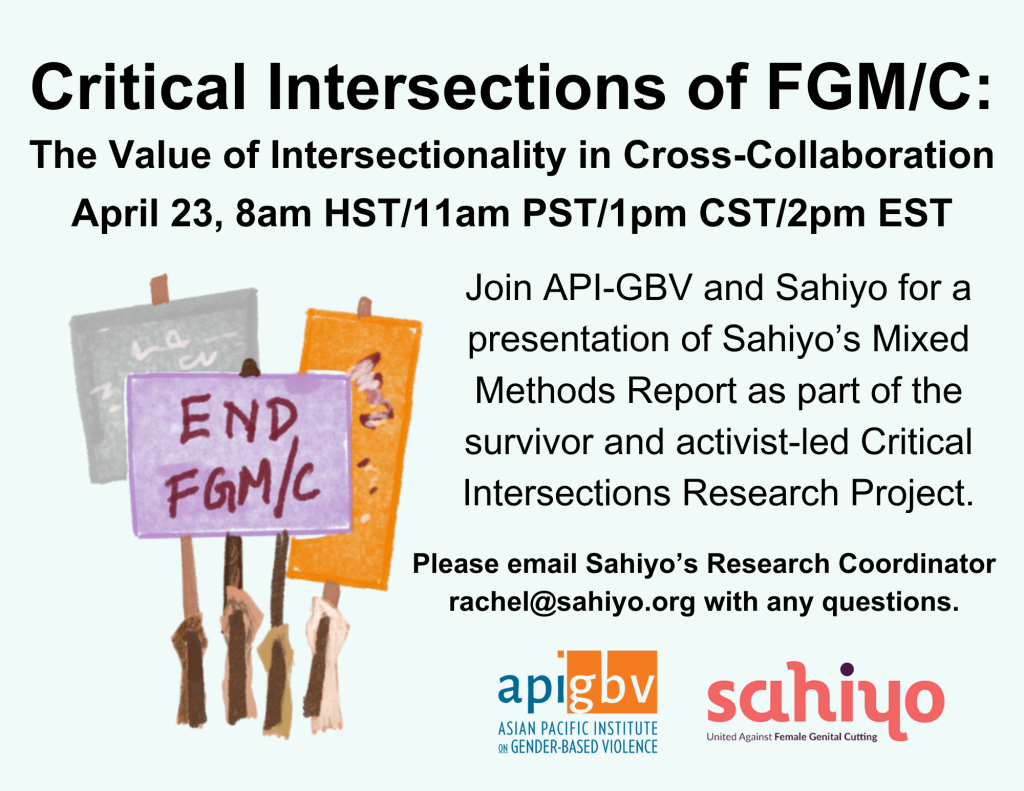
Sahiyo is excited to announce an upcoming event tied to our survivor and advocate-led Critical Intersections Research Project! This original research, which has been in development for over two years, examines the issue of female genital mutilation/cutting (FGM/C) through an intersectional lens. This includes an analysis of media on the topic (published in our first report), as well as data from a mixed-methods survey (published in our second report) and in-depth qualitative interviews (to be published later in 2024). The project seeks to understand both challenges that FGM/C survivors and activists face, as well as opportunities for cross-sector collaboration with other social justice movements. Critical Intersections of FGM/C: The Value of Intersectionality in Cross-Collaboration, hosted by API-GBV, will focus on collaborative aspects of social justice work. In hopes of facilitating meaningful discussion around cross-sector collaboration and intersectional programming, this presentation shares challenges and opportunities to collaborative projects found in our research, with plenty of time for feedback and weigh in from the audience. Because turning data into action is the goal, and Sahiyo continues its exploration on this topic, we hope to expand our understanding with the insights of activists, frontline professionals, and other attendees of this event. Event Date: April 23rd Event Time: 2:00-3:30 PM EST Registration: https://us02web.zoom.us/meeting/register/tZModOypqT0qG9BpxXwUcL_lIiFmUOSP_l49#/registration
Volunteer Spotlight: Programs Intern Sophia Jones

Sophia is an undergraduate student at Emmanuel College, pursuing a bachelor’s degree in developmental psychology, with a minor in sport management. She is passionate about learning, advocacy, and education within the human rights sphere. She is excited to join Sahiyo and be part of an organization that uplifts women and is working to enact change. What was your experience of learning about FGC for the first time like? I remember being acutely aware of female genital mutilation during high school and early college. I didn’t truly understand the practice and its implications until I joined Sahiyo. As I completed my onboarding, I remember feeling heavy and uncomfortable. It was difficult to reconcile all of the information I was presented with and understand why this practice continues. I found myself intrigued and researched any information I could to develop a greater understanding. When and how did you first get involved with Sahiyo? I first heard about Sahiyo through a posting on my college’s job board. I was looking for an internship and had just completed a course entitled Crimes Against Humanity and was motivated to become a more educated and involved world citizen. To me this means being more actively involved and informed about various social justice issues. I value hearing from those directly impacted by issues and finding ways to support them. After reading more about Sahiyo and their mission, I decided to apply and join the organization as an events and programs intern. What does your work with Sahiyo involve? As an events and programs intern, I work with Sahiyo to develop and execute webinars on topics related to FGC. I have spent the past several months researching and planning for a webinar on quiet activism and the psychosocial impacts of FGC. Additionally, I support the programs team with education and outreach initiatives such as trainings, webinars, and advertising the Asian Women’s Shelter FGC Hotline. I also have assisted with developing materials for print and social media. How has your involvement with Sahiyo impacted your life? My time with Sahiyo has been invaluable to my development as a professional and a person. Sahiyo and all of the individuals who I have had the pleasure of working with have taught me so much. It has been a privilege to be trusted with hearing survivor’s stories and being able to work as an ally and an advocate to end FGC. This experience has helped me to recognize how important social justice and advocacy is in my career and personal goals. What words of wisdom would you like to share with others who may be interested in supporting Sahiyo and the movement against FGC? I would encourage people to let themselves be uncomfortable and recognize that they won’t know everything. As an individual who has not personally been touched by the practice, I focused on listening to survivors and community members. By listening to those with personal experiences, it is easier to acknowledge and respect the cultural and traditional roots within practicing communities. Centering survivors and providing support for them is my biggest recommendation for those who are interested in supporting Sahiyo and the movement against FGC.
U.S. Activists Retreat 2024 Frequently Asked Questions
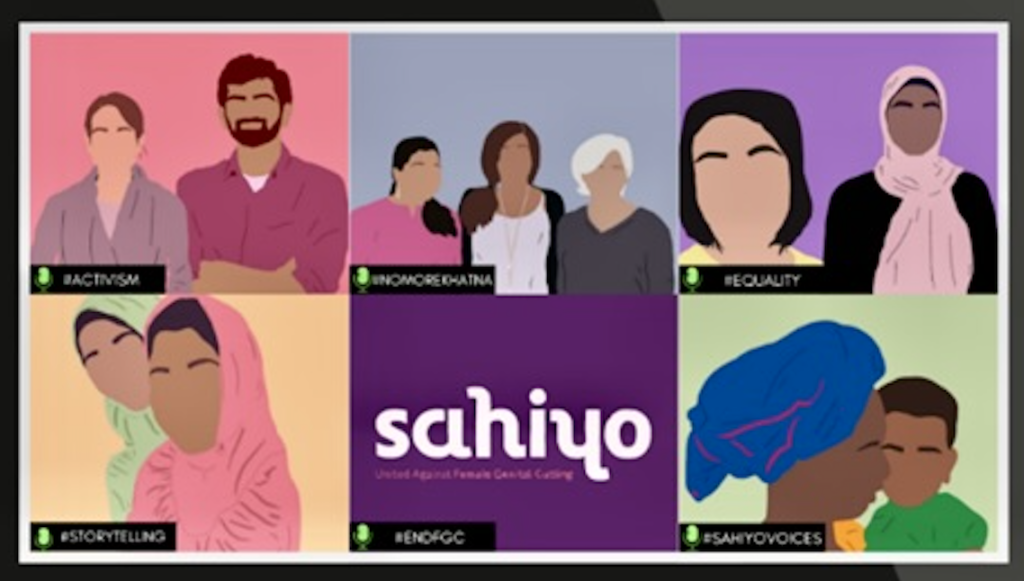
Who is this retreat for? Sahiyo is pleased to announce that the 2024 U.S. Activists’ Retreat to any person connected to a community or communities engaged in the practice of FGM/C and who is interested in ending the practice of FGM/C. Learn more about what the Retreat is all about from past retreat attendees who have written for our blog! Also watch: [youtube url= https://www.youtube.com/watch?v=Q6gC9F5pwI4] I am not an FGM/C survivor/I was subjected to FGM/C but I do not recall my experience/I was subjected to FGM/C but I have had no adverse effects from my experience. Am I still welcome? Yes! One does not have to be subjected to trauma or have a trauma response to have an interest in ending the practice. Everyone has a responsibility to do something and everyone interested in doing something can benefit by meeting with others who want to take action and learn more about what can be done. How much does it cost to attend the Retreat? There are no fees to attend Sahiyo’s Activists Retreat. Retreat registration is completely free and the virtual nature of the 2024 U.S. Retreat means that Retreat attendees should not incur any travel costs to attend the Retreat! How do I sign up for the Retreat? You can find our 2024 Activists’ Retreat interest form linked [HERE]! First-time attendees may be reached out to by a Sahiyo volunteer or Activists’ Retreat Planning Committee member for an informal phone or Zoom conversation regarding the Retreat and to answer any additional conversations you may have. We hope to hear from you! Is it possible to attend the retreat for just a single day? The purpose of the Activists Retreat is to allow activists to get together over the course of an entire weekend to build community, find support, and plan for future activism to end FGM/C. We ask that retreat attendees be able to attend all three days of the retreat in order to participate in all of the events, discussions, and presentations we have planned. We understand that a three-day virtual retreat may feel like an intense commitment, but we assure all prospective attendees that there will be many breaks and moments for self-care built in to make the Virtual Retreat an enjoyable, healing experience of community-building and learning. What should I bring to the Activists Retreat? Bring yourself, an internet connection, and your enthusiasm! What sorts of things will I learn at the Activists Retreat? A more complete agenda of events will be released to all Retreat Attendees closer to the date of the event. At this time, Retreat Attendees can expect to meet other activists, speak about their experiences as activists, and also learn from guest speakers. We will also have discussions about future activism, community building, and the Sahiyo Activists’ Toolkit. Learn more about Activists Retreat by visiting our blog and hearing from past participants themselves. Do you have more questions? Email Samman Masud at Samman@sahiyo.org today!
Reflections on Pain, Stigma, and Activism

By Tanya Samyak On December 6, 2023, Sahiyo organized a webinar titled Pain, Stigma and Sexual Health: Healing through Storytelling in collaboration with TightLipped, a grassroots organization supporting and advocating for individuals who experience chronic vulvovaginal and pelvic pain. Panelists shared their personal stories, which touched on topics survivors of female genital cutting (FGC) also can relate to like healing through storytelling and sexual health issues. The panelists included: Lakshmi Anantnaryan, who is an international women’s rights activist and alumni of Sahiyo’s Voices to End FGM/C project Grace Culqui, a women’s health advocate and an intern at TightLipped Lomaris Diaz, a veterinary anesthesiologist and active member of TightLipped Lakshmi, who has endometriosis, talked about how her inability to conceive a baby was the utmost concern for everybody around her and how much she was affected by societal beliefs that women’s bodies were only meant for reproduction and penetrative sex. In my opinion, this way of imagining the utility of women’s bodies demonstrates society’s ignorance about women’s sexual health. Her story also helped me understand that those experiencing endometriosis not only deal with physical pain but also emotional pain and a sense of embarrassment because of these patriarchal notions about a woman’s body. I also listened to the panelists who have vulvovaginal conditions speak about how they internalized the stigma they faced. Grace shared how some women experience shame in their relationships and an inferiority complex due to their sexual health challenges. She described how she felt she had to prove to her partner she was worthy to be in a relationship due to shame around her condition. Her experience articulates for me that there is a lack of understanding or representation of the conditions women may experience in mainstream media. Finally, Lomaris shared her experiences with healthcare professionals who didn’t understand her condition and further that there is a lack of information about chronic vulvovaginal conditions in the American gynecology curriculum. I understand now how this lack of education for healthcare providers can challenge someone with a vulvovaginal condition when they are seeking a healthcare provider who can properly diagnose their conditions and give conscientious support. These systemic issues can add to women’s suffering, and I commend Sahiyo and TightLipped for fostering a healing space and community that promotes the sexual health of survivors of FGC and vulvovaginal conditions.
New Report from the Population Institute on GBV: “Behind Closed Doors: Exposing and Addressing Harmful Gender-Based Practices in the United States”
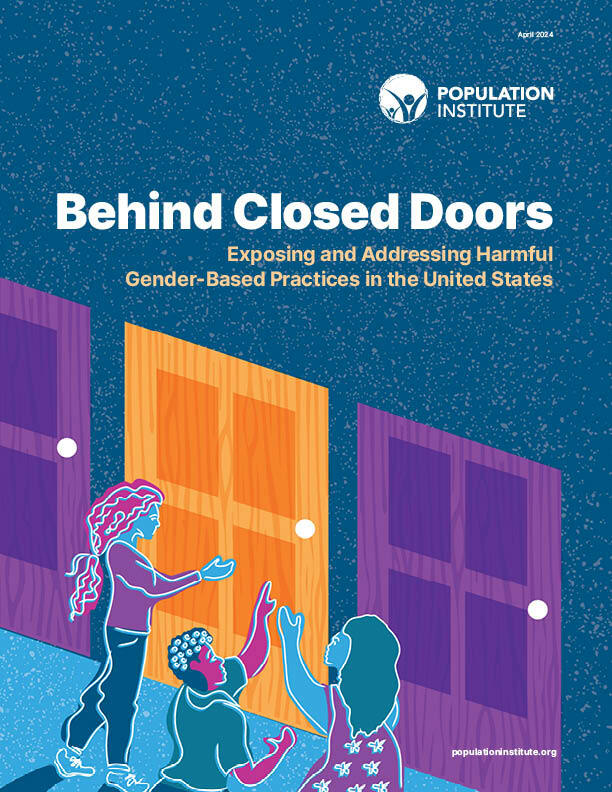
Read more in “Behind Closed Doors: Exposing and Addressing Harmful Practices in the United States.” Sahiyo is proud to help announce the publication of a new report by the Population Institute a nonprofit that advocates for gender equality and universal access to sexual and reproductive health services, titled, “Behind Closed Doors: Exposing and Addressing Harmful Gender-Based Practices in the United States”. The report tackles various forms of gender-based violence (GBV) occurring in the United States including female genital mutilation/cutting (FGM/C); child, early, and forced marriage/union (CEFMU); femicide, andvirginity testing. The report seeks to emphasize how prevalent these practices are in the United States, as they are often dismissed as harms that occur in foreign countries or other cultures, not here in the United States. However, these forms of GBV are increasing in the U.S. As reported by the Center for Disease Control and Prevention, with more than 500,000 women and girls are estimated to have undergone or are at risk of undergoing FGM/C in the US. The Tahirih Justice Center reports that at least 300,000 minors are estimated to have been married in the United States between 2000 and 2018. While theViolence Policy Center states that the rate of gender-based murder in the U.S. continues to be the highest amongst high-income countries, with a reported 2.2 per 100,000 women being intentionally killed in 2021. Women in the U.S. are 28 times more likely to be murdered with a gun than women in peer countries. These statistics highlight the need for educating people in the U.S. about the prevalence of various forms of GBV. This report also hopes to bring this crisis to the attention of U.S. policymakers, and other government officials who cansupport advocating for culturally competent legislation, survivor-focused initiatives and programs, and comprehensive sexuality education to counter these harms. Gender-based violence affects us all. Let’s create a culture of support and solidarity to uplift and empower survivors. Read about the widespread nature of harmful gender-based practices in the United States in the Population Institute’s latest report, “Behind Closed Doors: Exposing and Addressing Harmful Gender-Based Practices in the United States”.
Upcoming Event: “Impactful Media Reporting on Female Genital Mutilation/Cutting in the United States: A Conversation”
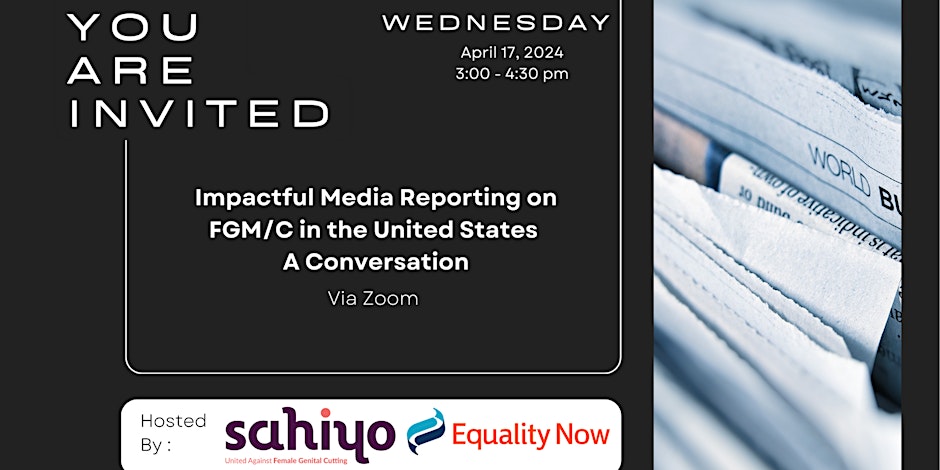
Date: April 17, 2024 Time: 3:00 PM to 4:30 pm EST Registration: https://bit.ly/FGMCMediaReporting Join Equality Now and Sahiyo U.S. on Wednesday, April 17, 2024, at 3:00 PM EST, for a discussion that will explore the intricacies of reporting on female genital mutilation/cutting (FGM/C). This invitation extends to all media professionals — reporters, journalists, editors, and communication and content creators — who are looking to deepen their understanding and refine their approach to covering FGM/C. This event is particularly timely, given the current landscape where misinformation about FGM/C often leads to narratives that are uninformed, conflated, or misrepresented The Need for Nuanced Reporting: FGM/C is recognized as a human rights violation and poses unique reporting challenges. It is essential for media coverage to navigate these complexities with care in order to avoid inadvertently causing harm while staying true to the lived experiences of those impacted by FGM/C. This webinar seeks to address the topic by equipping attendees with the skills to report on FGM/C in a manner that is both sensitive and accurate. Who Will Be Speaking? The event will feature a panel of media and advocacy experts, including Senator Karen Kaiser, Emma Batha of Thomson Reuters Foundation News, journalist Milena Mikael Debass, and documentary filmmaker Milena Warns from Without Exception Films. The moderators of this event are Sahiyo Co-founder and U.S. executive director, Mariya Taher, and Equality Now Communications officer for North America, Mel Bailey. Attendees will gain insights on: The prevalence and complexity of FGM/C within diverse cultural contexts in the U.S. The importance of engaging with survivors or those at risk with informed sensitivity. Strategies for using media platforms to raise awareness and educate the public on FGM/C. Analytical tools for covering related news, such as legal developments and community advocacy efforts effectively. Why Attend? This webinar represents an opportunity for media professionals to contribute meaningfully to the discourse on FGM/C. Through informed reporting, the media can play a pivotal role in supporting survivors and educating the public. This event is not just about reporting on a sensitive topic; it’s about doing so in a way that respects the dignity of those impacted and contributes to positive change. If you’re involved in media or interested in how media and communications can influence social issues thoughtfully, this event is for you. It’s an opportunity to learn, ask questions, and consider the best practices for reporting on cultural practices that can lead to harm, such as FGM/C. Register for the event here
